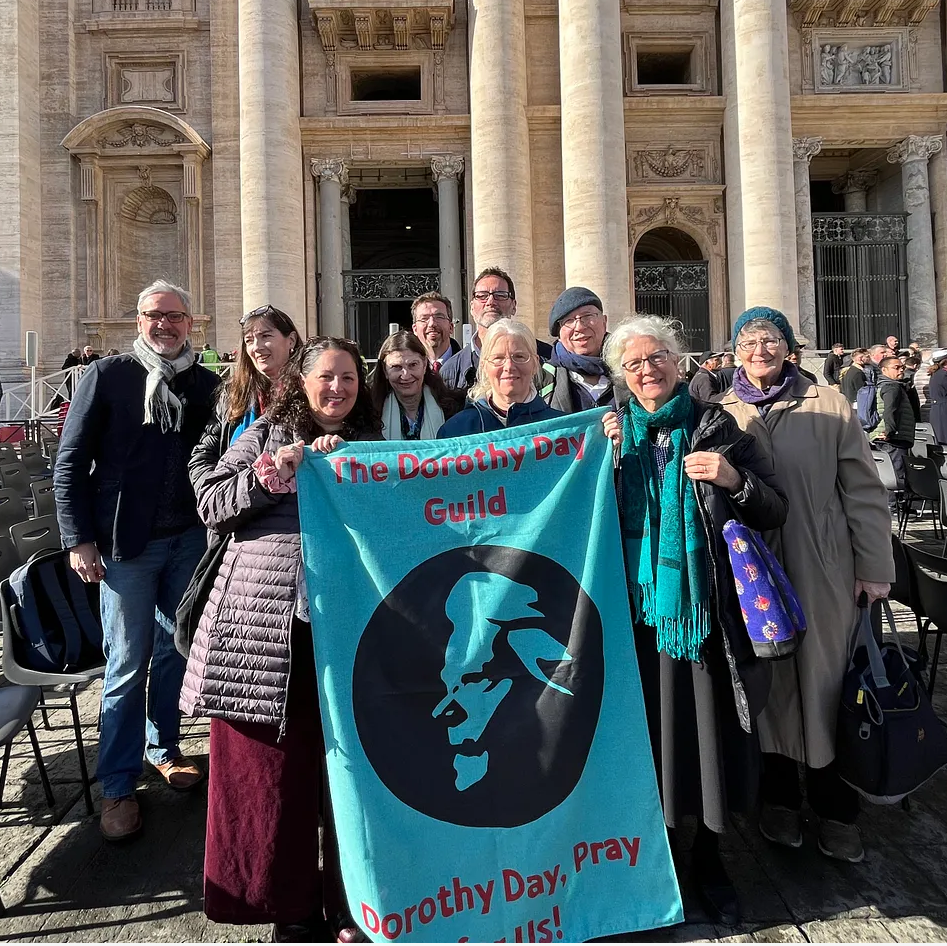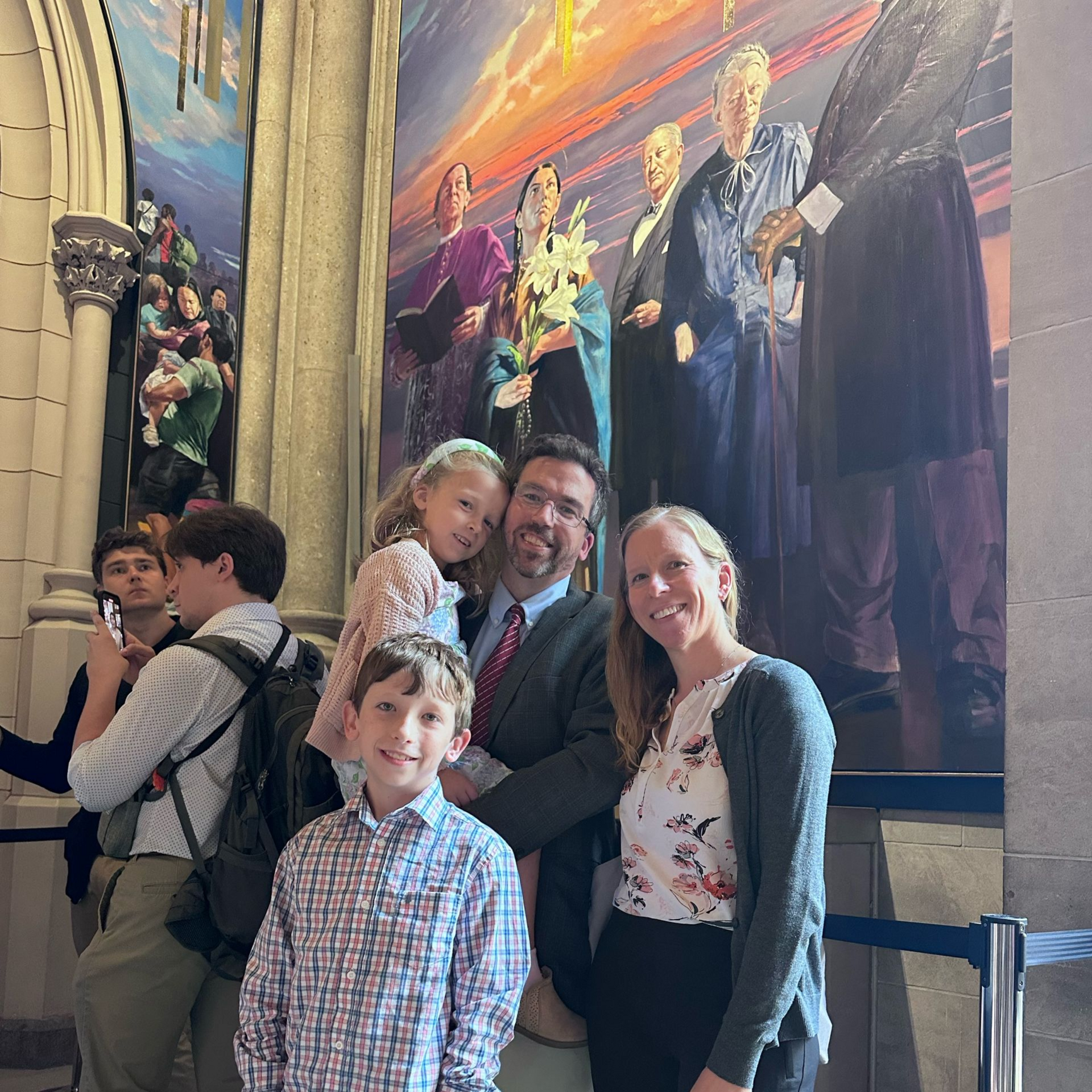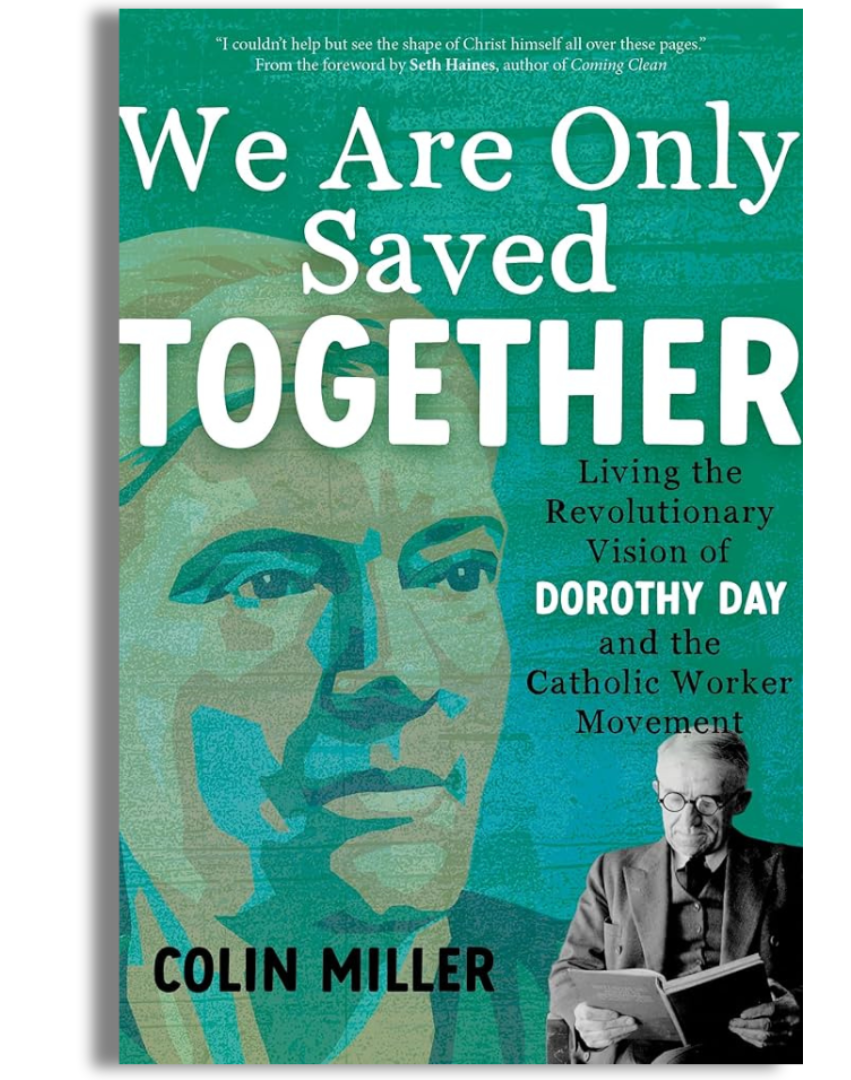We are also really enjoying Colin Miller’s new book, We Are Only Saved Together: Living the Revolutionary Vision of Dorothy Day and the Catholic Worker Movement, which was published by Ave Maria Press last month. This book explores Dorothy’s legacy through the lens of the universal call to holiness, and the Catholic Worker way of life as an antidote to a fragmented sense of self, vocation, and sanctity. Our culture has typically relegated holiness to the periphery and understood sainthood as the province of the few; Dorothy and Peter’s Catholic Worker program invites all of us to respond joyfully and wholeheartedly to God’s call.
Labor, Love, and Learning
Dear friends and members of the Dorothy Day Guild,
Hello, and warm greetings from all of us here at the Guild! We hope that the change of seasons has brought all of your summer projects to a satisfying conclusion, and for those who are now back to school as either students or teachers that the fall semester is off to a great start. I look forward to writing this letter every month, but particularly at the start of the school year when everything feels crisp and renewed. We have so many exciting updates and new resources to share with you this month!
First, in honor of National Hispanic Heritage Month, which began last week in the United States, we are very proud to announce that the main pages of our website are now available in Spanish. You can use the language buttons on our home page to toggle back and forth between English and Spanish. Many thanks to Magdalena Muñoz Pizzulic for her work on this translation. Originally from Chile, Magdalena is a recent graduate of the Master of Theological Studies program at the University of Notre Dame and now lives and works as a member of the St. Peter Claver Catholic Worker community in South Bend, Indiana. Magdalena’s linguistic skills, theological knowledge, and lived commitment to Dorothy’s legacy of nonviolence, voluntary poverty, and hospitality have been invaluable to us in increasing the accessibility of our online resources.
As we work to promote Dorothy’s cause for canonization in our global Church, we hope to continue making our Guild’s educational and devotional materials available bilingually, and eventually in other languages as well. Please keep us in your prayers as we continue this work, and for those who live, work, and worship in Spanish-speaking communities, please consider sharing Dorothy’s story with someone new this month!
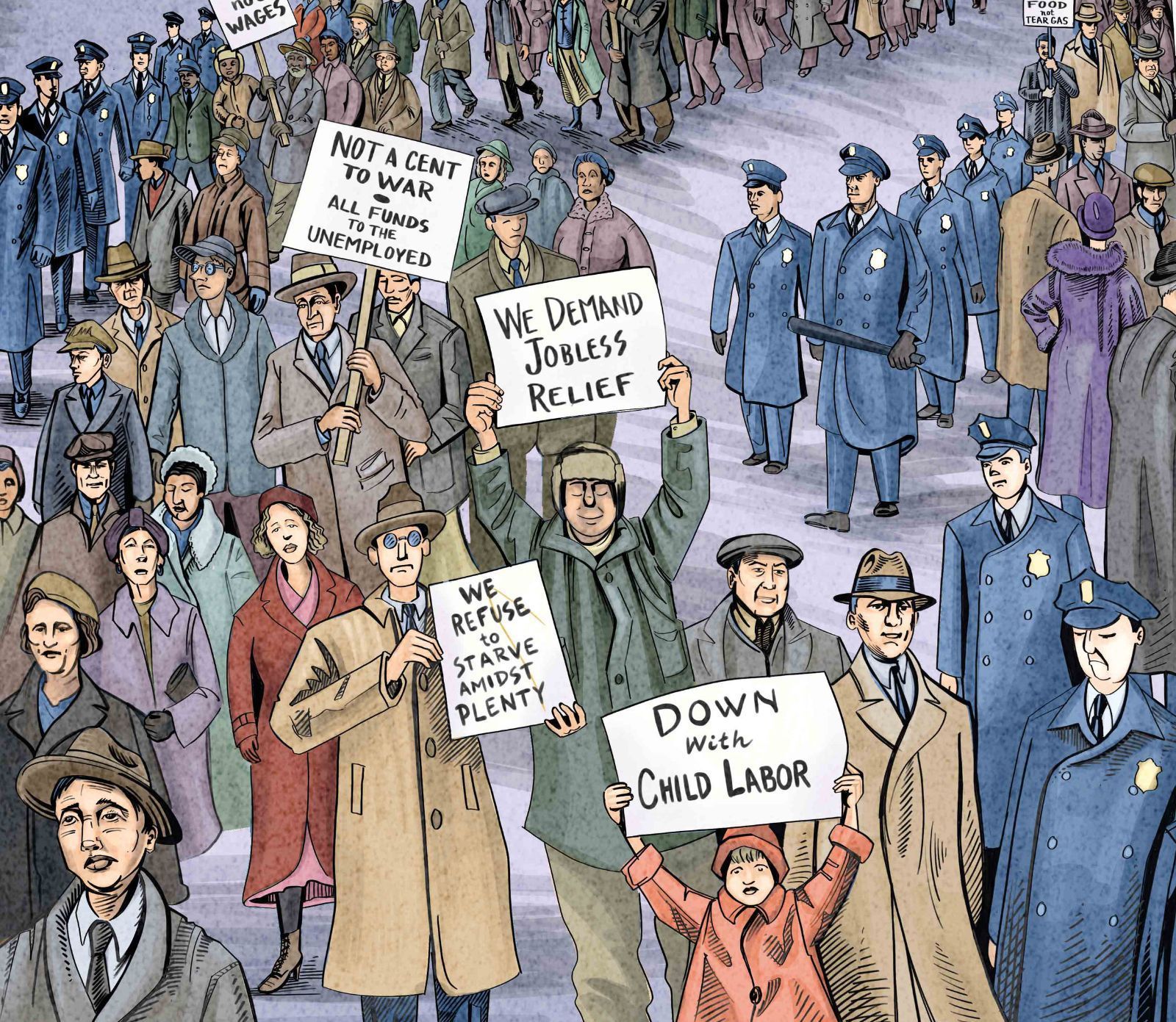
New books!
We are delighted to announce that two new books on Dorothy have been published in the last several weeks. Dorothy Day: Radical Devotion, Jeff Korgen’s graphic novel-style biography of Dorothy, which came out on Labor Day, was noted in the September issue of U.S. Catholic, and also received an excellent review from Jeromiah Taylor for the National Catholic Reporter. For those in the NYC area, Jeff will be offering a book talk at the Friday Night Meeting at Maryhouse on Third Street on November 8th, Dorothy’s 127th birthday! Stay tuned for further information about that event.
Celebrating, feasting, and worshipping together in community prepares us to offer up our lives and our work for the common good. As Colin writes on pages 61-62,
“At Mass we have to be physically together, materially in the same room, making the same bodily gestures, actually eating together, sometimes smelling the same smells, mouthing the same words. In a world of virtual everything, where you can be everywhere without every really being anywhere, what a remarkable contrast that salvation demands this in-the-flesh togetherness.
And it demands it because salvation is not just a matter of going to heaven when you die, but of beginning the life of heaven now, as Dorothy says. We are saved from isolation and for community, even in this life. It’s a thoroughly social matter, from the time we are baptized until, and including, the time we finally see God face-to-face.”
For a preview of Colin’s work, read a write-up from
The Irish Catholic and an excerpt from We Are Only Saved Together
here.
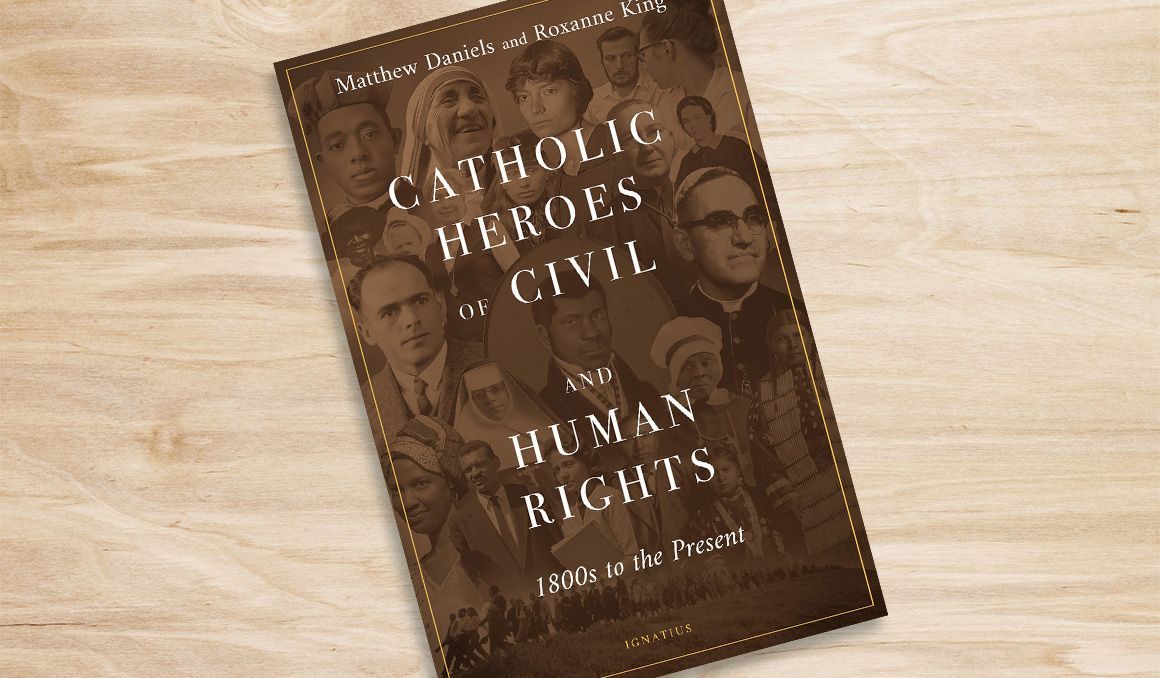
We also recently learned that Dorothy has been featured in a new collection of biographical profiles from Ignatius Press entitled Catholic Heroes of Civil and Human Rights: 1800s to Present, by Matthew Daniels and Roxanne King. Placing Dorothy in the company of holy men and women including Venerable Father Augustus Tolton, Blessed Franz Jagerstatter, Servant of God Nicholas Black Elk, St. Katharine Drexel, St. Teresa of Calcutta, St. Oscar Romero, Venerable Pierre Toussaint, and Servant of God Sister Thea Bowman, “this survey features men and women whose faith drove them to courageously defend the dignity of the children of God, especially the most vulnerable. In doing so, they transformed others’ lives and paved the way for a more loving and equitable society.” Read a review from Angelus News here.
Additional Reading, Watching, and Listening Recommendations:
Earlier this summer, our friend Anna Blackman from the University of Glasgow interviewed Dorothy’s granddaughters Martha and Kate Hennessy for Political Theology Network. Anna’s thoughtful questions cover Dorothy’s influence on the sisters’ early formation through the particular ways they are each living out her legacy in the present, the central role of nonviolence in Dorothy’s spirituality, and what the economic precarity of the Catholic Worker movement can offer the broader church. What follows is a short excerpt from the interview:
Anna: Both of you have also followed Dorothy’s example in practical ways; Martha with your peace activism and Kate with your writing as well as your art, which has always played a prominent role within the Worker. And I know that, like for Dorothy ,faith has also played a big role here. Could you speak a little bit about these aspects?
Martha: The Plowshares action deepened my faith. These experiences of actually applying your faith to action, living it in a very real way in the world is always clarifying and strengthening. I don’t know that I could have walked onto that base with the nuclear weapons without feeling like, “Okay, I’m here with my comrades, this is what we believe, God is not with these weapons, God is with getting rid of these weapons.” That’s what gave me strength and focus. I don’t believe Dorothy could have done what she did for nearly 50 years, the destitution, the horror, the injustice, the filthiness, the chaos, all the ways we don’t want to live right there in our faces, without some kind of faith.
Kate: I believe in a storytelling theology; that’s how we learn. That’s how we grow as individuals and as communities. Each new creative way that we tell our stories, whether it’s written word or music or art, it binds us together. I think the role of art is to help us see ourselves more clearly. To recognize ourselves, our humanity. In the Worker … Well Dorothy said, “Well, a lot of people can’t read so you give something for them to look at,” but I think she, we, just love it. We love art. How can we stop ourselves from loving art, whether it’s visual arts or music or dance or theater or storytelling? It feeds our soul. It leads us to understand ourselves better. And I think the world will be saved by beauty. I also believe that the world is being saved by beauty every day, we’re just not paying attention
While the shorter version of this interview has been available since the summer, we recently received permission to share the full version published in the academic journal Political Theology with all of you! Many thanks to Dr. Vincent Lloyd and his co-editors for making this excellent interview available to the members and friends of the Dorothy Day Guild.
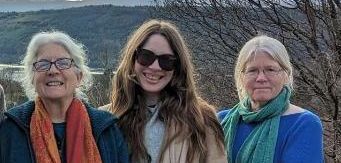
Kate was also interviewed this month for EWTN News Nightly. This short interview touches on a range of topics, and when asked what she believed her grandmother was still offering to the world, Kate said, “I think she’s teaching us hope. That there’s always something that we can do. I think she’s teaching us to follow our conscience, to really understand what we say we believe and live by that.” More than forty years after Dorothy’s death, the world certainly still needs those teachings! You can watch the full interview on the EWTN YouTube channel.

Political Theology Network also published a piece this month by Dr. Marty Tomszak, entitled “They Shall Not Pass! The Catholic Worker Ethos, Faithful Direct Action, and the Anti-Fa Christ”. Marty’s article looks to Dorothy’s prophetic witness as a powerful counter-praxis to the contemporary rise in fascism and anti-immigrant rhetoric in the United States and Europe. Marty notes that,
“Day was aware of the ways in which the Imago Dei of workers and guests could be damaged not just by a lack of access to material resources but by the anti-human systems which created spiritual and physical poverty. This is why in addition to the “traditional” aspects of the Catholic Worker, Day found it fundamental to participate in direct action against the State.”
Dorothy’s steadfast allegiance to the Kingdom of God over and against any earthly empire offers us a necessary exemplar of faithful discipleship in the political realm. Many thanks to Marty for highlighting some of the most challenging aspects of Dorothy’s legacy in our present moment.
We would like to bring to your attention two more articles from this month’s U.S. Catholic. Reflecting on economic justice, Renée Roden asks “What did Dorothy Day say about capitalism?” Locating Dorothy’s economic philosophy in the promotion of the common good, Renée writes that,
“Day did not just want to protest the way things were: the Catholic Worker movement had a long-term vision for the reconstruction of the social order, “to take the place of both capitalism and communism,” Day wrote in 1953. Here, too, her view aligns with traditional Catholic teaching. According to the catechism, the church “has rejected the totalitarian and atheistic ideologies associated in modern times with ‘communism’ or ‘socialism.’ She has likewise refused to accept, in the practice of ‘capitalism,’ individualism and the absolute primacy of the law of the marketplace over human labor . . . Reasonable regulation of the marketplace and economic initiatives, in keeping with a just hierarchy of values and a view to the common good, is to be commended.”
Day imagined an economic reality that honored the dignity of the human person, based on the universal brotherhood of the mystical body of Christ. This reality was incarnated through economic cooperation, rather than in competition.”
Our co-chair, Dr. Kevin Ahern, was also recently interviewed by Jenn Morson for her article, “The Catholic Church has a cult of personality problem.” Responding to recent heterodox, antisemitic statements by prominent converts to the Catholic faith and attacks on Pope Francis, Kevin distinguishes between celebrity, which worships status and fame for their own sake, and exemplarity, which guides us towards holiness. Although Dorothy was well-known in both Catholic and secular circles by the end of her life, she was often uncomfortable with her own notoriety and did not like being put on a pedestal.
“We have a celebrity culture that makes people caricatures of themselves, which has caused a lot of disappointments, but the theology of sainthood is one that recognizes the humanity of the person,” Ahern says.
For Ahern, Day’s life is in direct contrast to the concept of celebrity, because her work always pointed towards others. But he does aspire to elevate her as an exemplar to follow for personal development. “Dorothy lived in community with people, cooked with them, shared living quarters with them,” Ahern says. “Perhaps the way we avoid celebrity culture is community, inviting key exemplars into our community rather than making them the center of it.”
Finally, Atlanta-based singer and songwriter Brianna McGeehan just released a long-anticipated new single at the beginning of September. Entitled “Home,” this song draws on McGeehan’s lifelong fascination with Dorothy. In an interview for The AU Review, McGeehan said,
“When I was 19, I wanted to be her. I tried to read all the same books she read, I went to mass every Sunday. Dorothy Day was so cool—she lived in voluntary poverty, and she was all about community, and that’s how we heal. The people I respect most all have that same philosophy… [“Home” is] about how if we don’t make some changes, people will continue to suffer.”
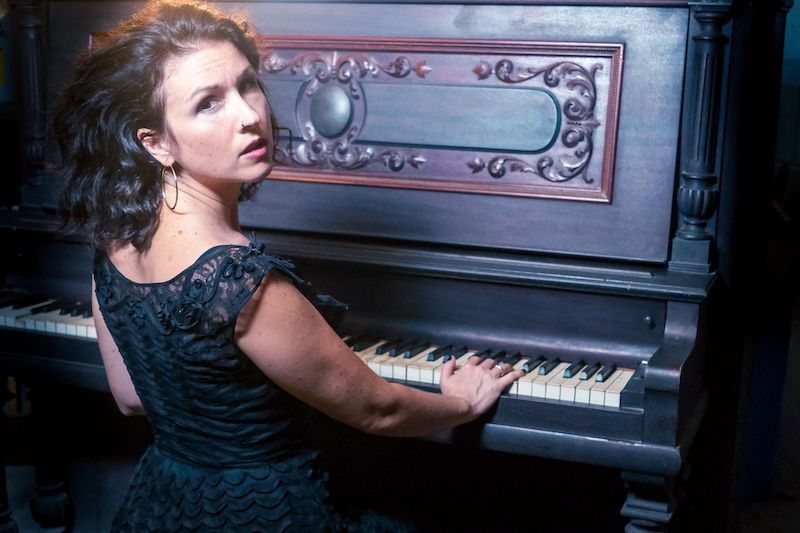
In another interview, McGeehan spoke about attempting to inhabit Dorothy’s way of seeing and understanding the world in her music, stating,
“I think so much about songwriting is perspective. What am I trying to say, and from what perspective am I saying it? “Home” is absolutely a product of my studies, particularly reading those authors like Bell Hooks and Dorothy Day, who really affected me. They both cultivated their perspectives and philosophical views from an abundance of study. Their opinions are highly informed and incredibly insightful. I really try to inhabit the perspective of the people I find insightful and revolutionary, and want to read everything by them. And I want to make music that’s revolutionary and comforting at the same time. I find the perspective of both of these women to be just that—revolutionary and comforting.”
You can check out McGeehan’s Instagram and website for more of her music and upcoming shows. We continue to be so impressed by the variety of work that has grown out of Dorothy’s witness! If you are working on a creative or academic project about or inspired by Dorothy, please let us know. We’d love to help you share it with our network.
Recent Happenings:
September has already been full of excitement, and we’ve had some wonderful opportunities to gather and continue engaging with the legacy of nonviolence, hospitality, and voluntary poverty that Dorothy has conferred on us. Members of the Dorothy Day Guild had a chance to support a union action by the
Maritime Masters, Mates, and Pilots, members of which crew the Staten Island Ferries, including the Dorothy Day. Joined by the
NYC Organization of Public Service Retirees, the two labor organizations designed a float based on the Dorothy Day ferry for the annual Labor Day parade and mass at St. Patrick’s Cathedral on September 7th. Longtime supporter of the Dorothy Day Guild and executive director of Catholic Charities NY Monsignor Kevin Sullivan spoke with Patrick Grady from
The Good Newsroom on behalf of the day laborers who Catholic Charities is helping organize, highlighting the importance of ensuring that respect for labor– a central value of the Catholic social tradition– is enacting in the wages and working conditions of all day laborers, many of whom are recent immigrants.
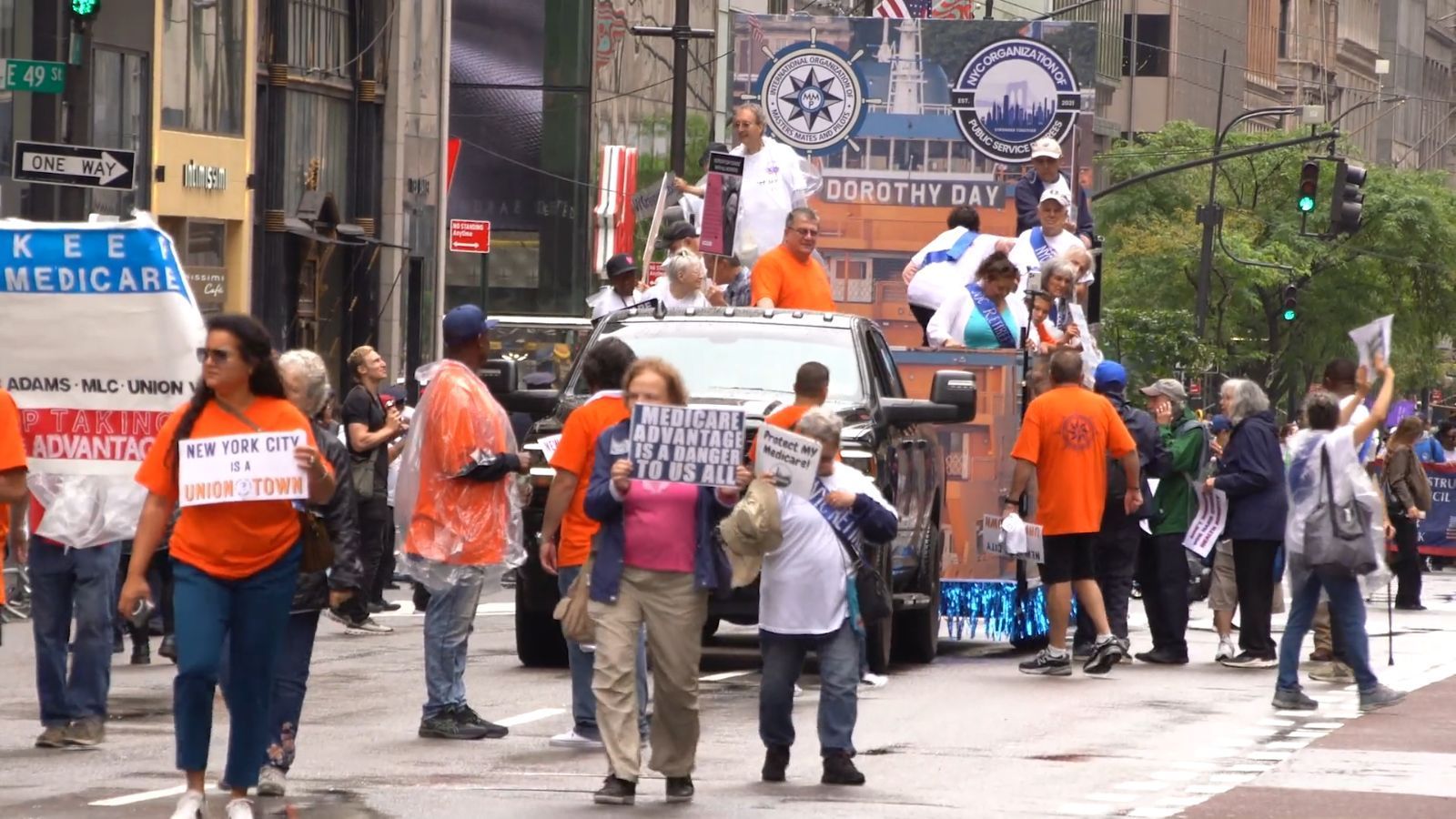
Dorothy Day Guild members Joe Sclafani and Jodee Fink also spoke with The Good Newsroom to explain why the Guild felt it was so important to participate in the Labor Day mass and demonstration. Carrying a sign which read “Dorothy Day Stands with All Workers,” Joe stated, “Today we are going to be marching with workers as Dorothy would have done years ago.” George Horton, our vice postulator, elaborated, “Dorothy Day loved workers. She believed in the dignity of work and the importance of caring for people who were working and people who were unable to work.” Our thanks go out to Marianne from the NYC Organization of Public Service Retirees for inviting us to participate in this wonderful event.
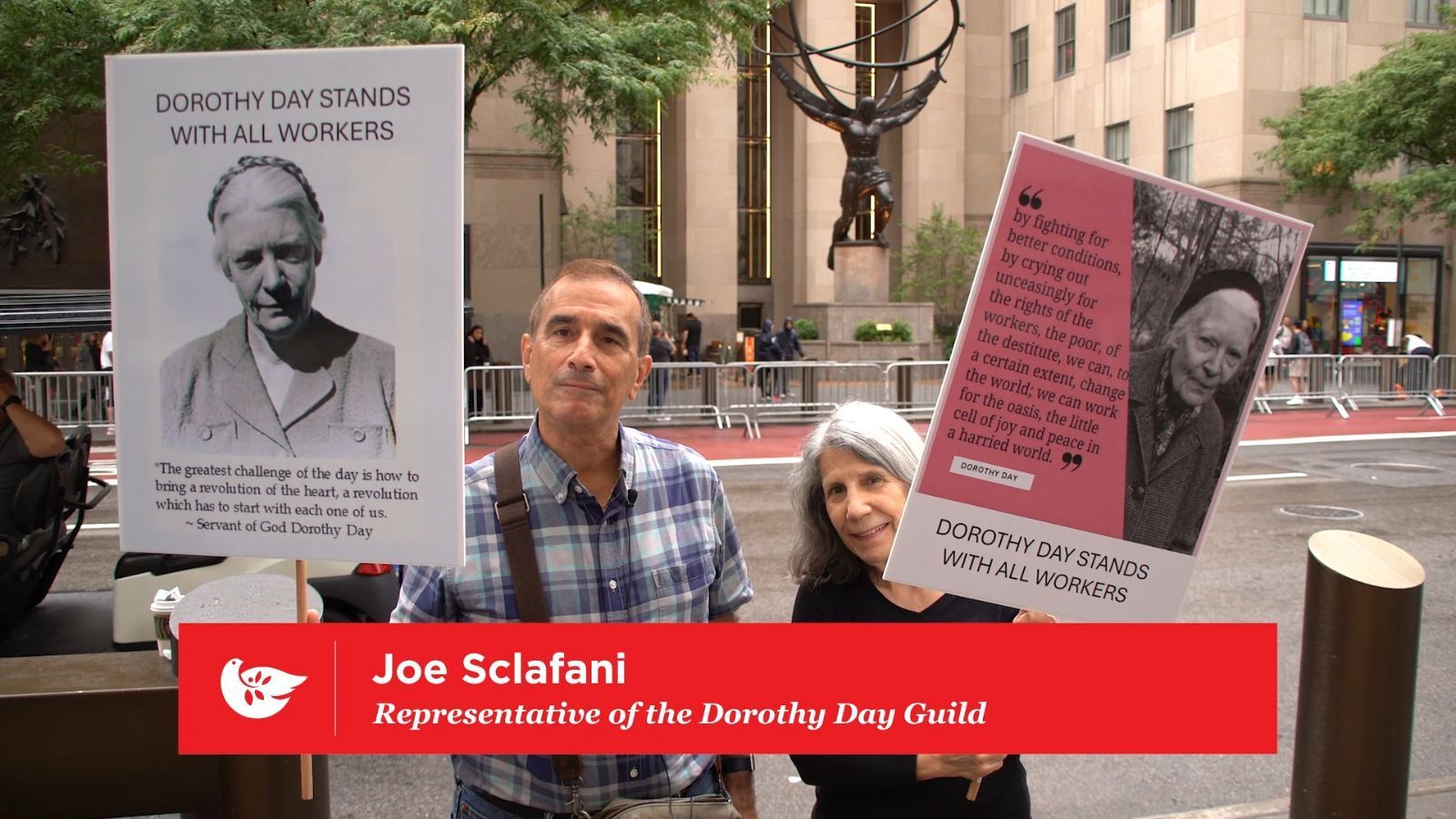
The parade is an opportunity both to celebrate the dignity of work and to continue organizing and agitating for labor justice, a cause to which Dorothy was deeply dedicated during her lifetime. The Maritime Masters, Mates, and Pilots union marched for a fair contract and the NYC Organization of Public Service Retirees to protect the healthcare of over 250,000 retired workers. Please remember all of these workers in your prayers and ask Dorothy’s intercession on behalf of their organizing and union efforts!
That same weekend in Chicago, many of our friends gathered to participate in the first academic conference on the life and work of Peter Maurin, Dorothy’s mentor, friend, and co-founder of the Catholic Worker movement. While Peter’s writing and philosophy hasn’t yet received the degree of recognition that Dorothy’s has, his scholarship and agricultural background provided a solid foundation for the young Catholic Worker movement in its first two decades and beyond. Conference participant Tommy Cornell, of the Peter Maurin Farm in Marlboro, NY, offered this perspective on Peter’s significance for Dorothy and for the Catholic Worker movement: “Dorothy spoke this truth. People don’t understand that she needed [Peter’s] intellectual grounding in Catholicism, his Catholic view of history.”
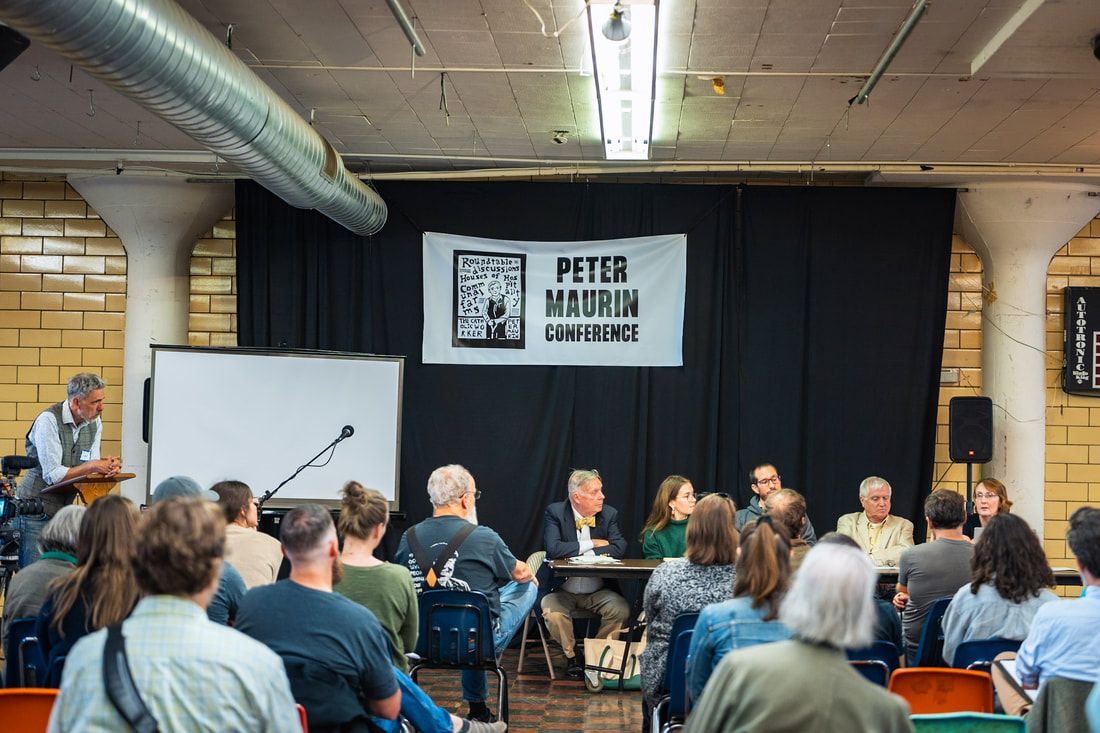
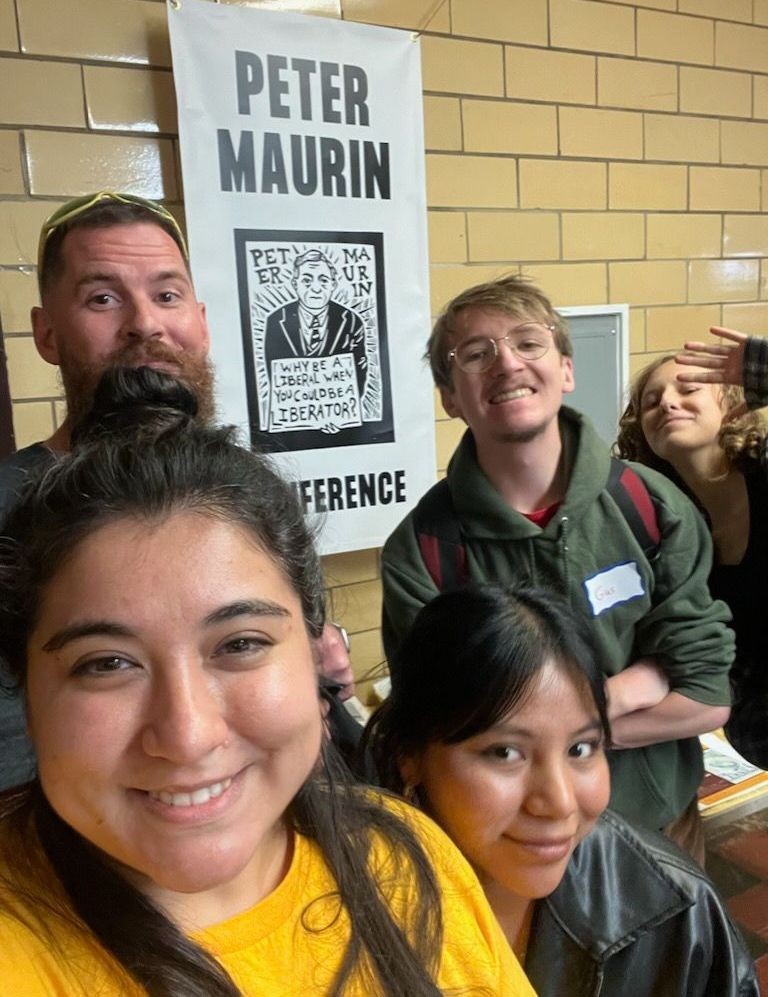
Hosted by St. Gregory Hall and Canterbury House, and attended by an intergenerational group of over one hundred Catholic Workers, academics, and students, the conference was an incredible opportunity to enact Peter’s dream of bringing workers and scholars together for a weekend of roundtable discussions, keynotes, prayer, and fellowship. You can view a slideshow of photos from the conference on the St. Gregory Hall website, and be sure to keep an eye out for forthcoming videos of the talks and conference sessions.
Two weeks later, Catholic Workers from as far apart as Western New York and southern Missouri came together for the annual
Sugar Creek Midwest Catholic Worker Gathering near Preston, Iowa, and at the beginning of October, St. Francis House in Chicago will host the 2024 National Catholic Worker Gathering in honor of their community’s 50th anniversary of hospitality and activism. It has been so great to have all of these opportunities to gather, reflect, discern, and celebrate in this season. Our thanks go out to everyone who has helped organize these events, and we hope to see many of you in Chicago!
Upcoming Events:
We would like to invite you to join us for three more upcoming fall events, these ones in Boston and online and the New York metro area. On Wednesday, October 23rd at 7:30 pm, the Beacon Hill Friends Meeting invites you to a talk and discussion by Jeff Korgen, titled “Dorothy Day: Radical Devotion,” after his new book.
This free program is part of the Beacon Hill Friends House series MIDWEEK: Experiments in Faithfulness.
MIDWEEK is a weekly, one-hour, facilitated spiritual practice with Quaker flavor and an experimental ethos, so named after the Quaker tradition of midweek (Wednesday) worship. Jeff’s presentation and discussion will share the story of Dorothy’s life as a journalist and peace activist and will include the important influence of two Quakers on her articulation of Gospel pacifism. You are warmly invited to join at the Beacon Hill Friends House in Boston, or online from anywhere!
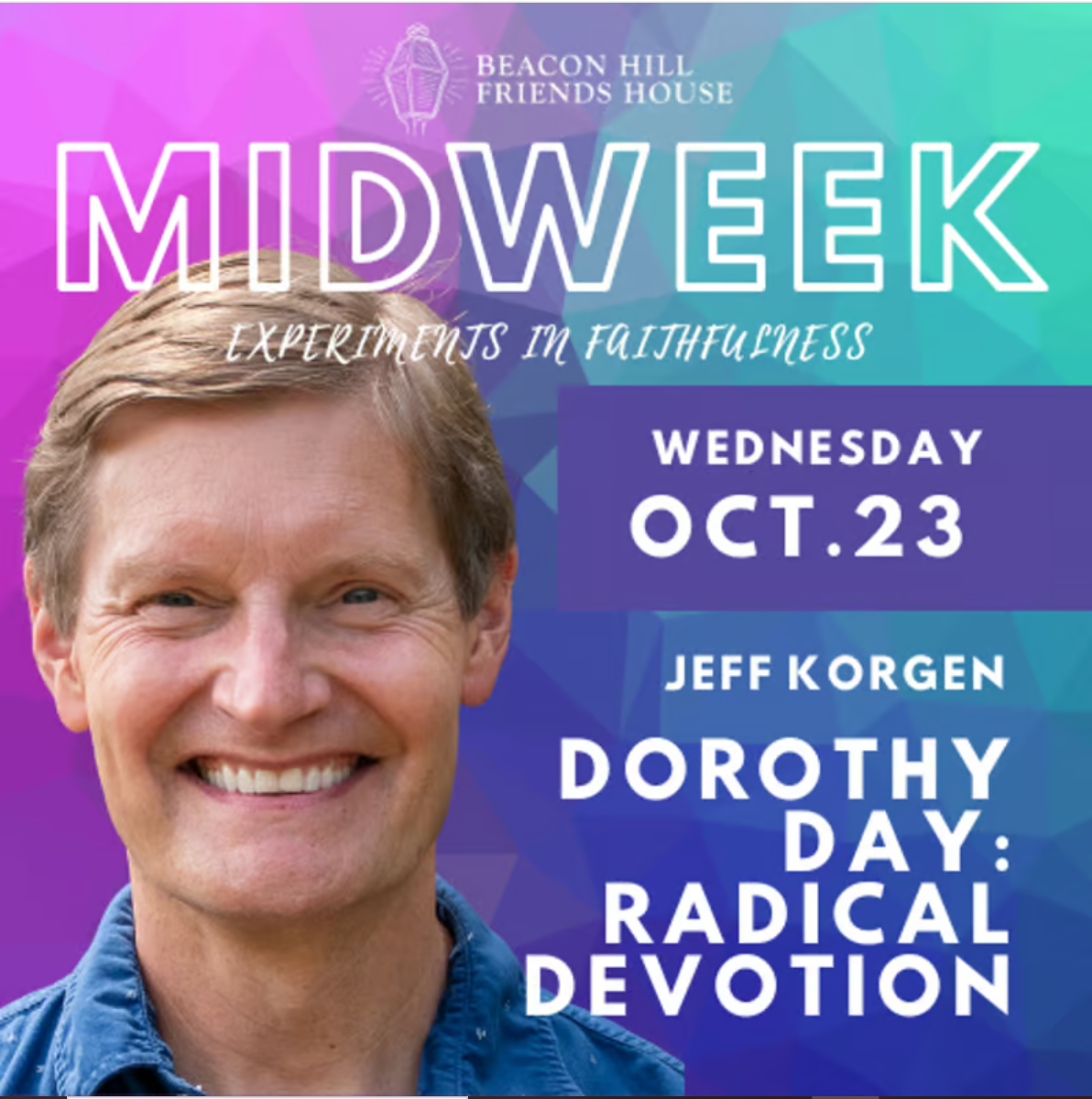
On Friday, October 25th at 3:00 pm, the Dorothy Day Guild is hosting another walking pilgrimage! This was so popular last year that we’ve decided to offer it again. Come with us as we journey together and visit important sites from Dorothy’s life in lower Manhattan, beginning in Union Square where she sold the first issue of The Catholic Worker newspaper and concluding at Maryhouse, her final home. This event is offered free of charge; please register using this form.
Looking ahead to November, Guild board member Martha Hennessy will be offering a talk on “Dorothy Day: Servant of God and Modern-Day Prophet” at Seton Hall University in New Jersey on Wednesday, November 6th at 2:00 pm. Martha will offer some personal memories of her grandmother and will share her own experiences as a peace activist and member of the Catholic Worker movement.
The Dorothy Day Guild board of directors and advisory committee will hold their annual meeting at Manhattan College on Saturday, October 26th to continue developing our mission and visioning our work in the next stage of Dorothy’s canonization cause. We also are excited to be co-sponsors of the Joshua Casteel Memorial Peace Dinner on November 19th at the US Conference of Catholic Bishops’ November meeting in Baltimore with our friends from the Catholic Peace Fellowship. Please keep both of these upcoming events in your prayers. We look forward to sharing more information about these gatherings with you soon, and hope to offer a series of follow-up events to the Peace Dinner in the Midwest and on the East Coast this spring, so please watch our website and stay tuned for an invitation!
Prayer requests:
This month we would like to share two important prayer requests from folks on our mailing list and friends of Guild members. Rosalie wrote to us from New York with a prayer of thanksgiving for the healing she received from complications of previous strokes, a recovery which she credits to Dorothy’s prayers. For this healing, thanks be to God! We are always so happy when we have the chance to share this kind of news with all of you.
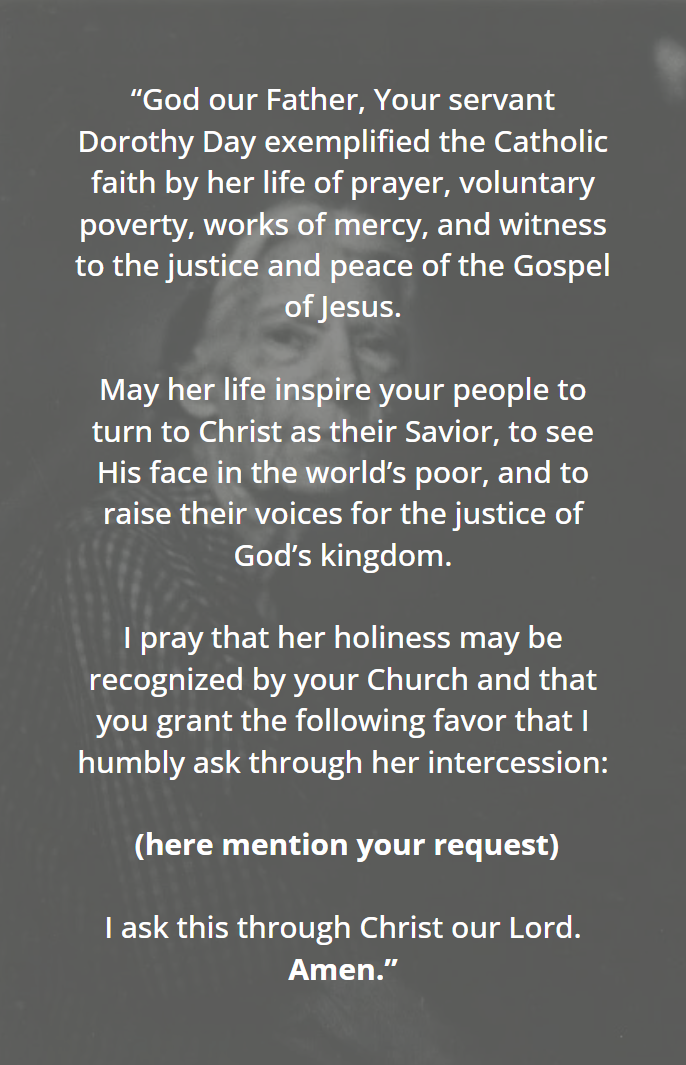
We also ask your prayers for Brad in Montana, who is currently undergoing cancer treatment. Please join us in asking God through Dorothy’s intercession for a miracle on Brad’s behalf, for his present comfort, and for strength and courage for his wife and two daughters. During her lifetime, Dorothy encouraged her friends and community members to be bold in asking for God’s help, and we have no doubt that she continues to do this on our behalf now that she sees God face to face.
Please hold Brad and Rosalie and their families in your prayers this month, as well as the several other people who have recently reached out to us with sensitive requests. Praying for the needs of our loved ones and of the world through Dorothy’s intercession is an important work of the Guild, and we invite you to reach out to us if you would like to be added to our prayer list. If intercessory prayer or praying with the saints is a new practice for you, we encourage you to use the
prayer available on our website. Thank you all for your commitment to this spiritual work of mercy!
A few words from Dorothy:
In September of 1974, Dorothy wrote a meditative, reflective column from the Tivoli Farm, grounding herself in the abiding goodness of Creation in the face of political and economic upheaval all around her. She began:
“A beautiful calm, quiet day. How beautiful silence is. How beautiful all nature around us, as the Queen Anne’s lace in a brown vase on my window sill… I look back on my childhood and remember beauty. The smell of sweet clover in a vacant lot, a hopeful clump of grass growing up through the cracks of a city pavement. A feather dropped from some pigeon. A stalking cat. Ruskin wrote of ‘the duty of delight,’ and told us to lift up our heads and see the cloud formations in the sky. I have seen sunrises at the foot of a New York street, coming up over the East River. I have always found a strange beauty in the suffering faces which surround us in the city. Black, brown, and grey heads, bent over those bowls of food, that is so necessary food which is always there at St. Joseph’s House on First. St., prepared each morning by Ed Forand or some of the young volunteers. We all enter into the act of hospitality, one way or another. So many of those who come in to eat return to serve, to become part of the ‘family.’”
Dorothy had a remarkable gift for discharging that ‘duty of delight,’ which she honed through spiritual disciplines of prayer, protest, service, and reflective gratitude. She saw beauty in all of God’s works, but found it most persistently in the natural world and in the company of the poor. As we celebrate the fall equinox and the impulse towards recollection that the change of seasons inspires for so many of us, we hope that you, like Dorothy, are called back to such flashes of beauty in your own lives and memories.
In peace,
Dr. Casey Mullaney, on behalf of the Dorothy Day Guild
Share this post
